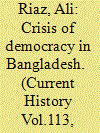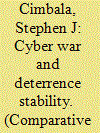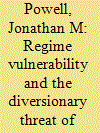|
|
|
Sort Order |
|
|
|
Items / Page
|
|
|
|
|
|
|
| Srl | Item |
| 1 |
ID:
129652


|
|
|
|
|
| Publication |
2014.
|
| Summary/Abstract |
Since its independence in 1971, Bangladesh has experienced tumultuous times. The country endured prolonged military rule from 1975 to 1990, but democratic aspirations have defined the course of its politics. In the past four decades, Bangladesh has experimented with various systems of governance, including one party presidential rule and, currently, a multiparty parliamentary system, having returned to parliamentary democracy in 1991. Bangladesh has demonstrated favorable elements of democracy, such as high levels of political participation, a plethora of political parties, a growing middle class, a vibrant civil society, and periodic elections. Yet the nation has undergone repeated reversals of democratic gains, thanks to civilian authoritarianism and military dictatorship. The polity has suffered from an absence
of strong institutions to ensure the rule of law, accountability, and transparency in governance.
|
|
|
|
|
|
|
|
|
|
|
|
|
|
|
|
| 2 |
ID:
133995


|
|
|
|
|
| Publication |
2014.
|
| Summary/Abstract |
Nuclear deterrence and cyber war are often discussed as separate worlds of research and military-strategic practice. To the contrary, a certain degree of overlap between nuclear deterrence and cyber conflicts is a plausible expectation for several reasons. First, future deterrent challenges will include regional nuclear arms races accompanied by competition in information technology and other aspects of advanced conventional command-control and precision strike systems. Second, cyber-attacks may be used against opposed nuclear command-control systems and weapons platforms as well as against infrastructure for the purpose of mass disruption during a crisis or war. Third, cyber capabilities support escalation dominance or escalation control, depending on the objectives of states and on the transparency of identification for cyber friends and foes.
|
|
|
|
|
|
|
|
|
|
|
|
|
|
|
|
| 3 |
ID:
128972


|
|
|
|
|
| Publication |
2014.
|
| Summary/Abstract |
In this article, I move beyond prior efforts to explore the relationship between the risk of a coup and international conflict by considering alternatives that leaders can utilize to strengthen their regimes. I offer two theoretical expectations. First, I theorize that leaders lose the incentive and ability to use diversion when the structural coup-proofing apparatus is strengthened. Second, I expect military finances to lead to disparate behavior when considering regime type. Autocrats are expected to use military funds to provide private incentives to the armed forces, largely in the form of allowances. Democracies, in contrast, will be required to use expenditures to promote the public good of national security due to the transparency of their regimes. Autocrats are expected to lose the incentive to use diversion as the financial endowment of their militaries increase, while democracies will continue to show a diversionary trend due to their increased military capabilities. The theory is tested using global data from 1962 to 2000, with the findings strongly supporting the theory.
|
|
|
|
|
|
|
|
|
|
|
|
|
|
|
|
|
|
|
|
|